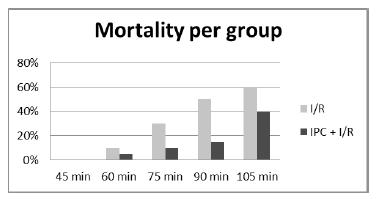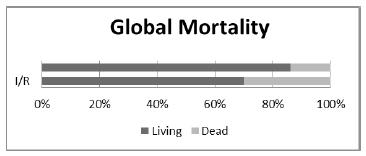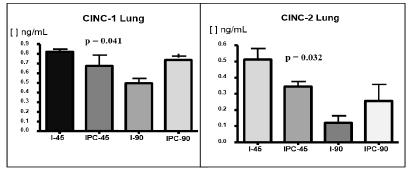PURPOSE:
To evaluate the effect of ischemic preconditioning on mortality, inflammatory mediators and oxidative stress after intestinal ischemia and reperfusion.
METHODS:
Male Wistar rats were allocated according to the period of ischemia with or without ischemic preconditioning which consist on clamping the superior mesenteric artery for 10 minutes followed by reperfusion for 10 minutes before the sustained ischemia period. Mortality was assessed in Phase 1 study, and the CINC-1, CINC-2 and MDA levels in the lungs were analyzed in Phase 2.
RESULTS:
Mortality was lower in the ischemic preconditioning group subjected to 90 minutes of ischemia compared to the group without ischemic preconditioning (I-90: 50% and IPC-90: 15%, p=0.018), and it was lower in the ischemic preconditioning group as a whole compared to the groups without ischemic preconditioning (IPC-14% and I=30%, p=0.006). Lower levels of MDA, CINC-1, and CINC-2 were observed in the animals that were subjected to ischemic preconditioning compared to the animals that were not (MDA: I-45=1.23 nmol/mg protein, and IPC-45=0.62 nmol/mg protein, p=0.0333; CINC-1: I-45=0.82 ng/mL and IPC-45=0.67 ng/mL, p=0.041; CINC-2: I-45=0.52 ng/mL and IPC-45=0.35 ng/mL, p=0.032).
CONCLUSION:
Ischemic preconditioning reduces mortality, inflammatory process and oxidative stress in rats subjected to intestinal ischemia and reperfusion.
Ischemic Preconditioning; Reperfusion; Mortality; Oxidative Stress; Rats




